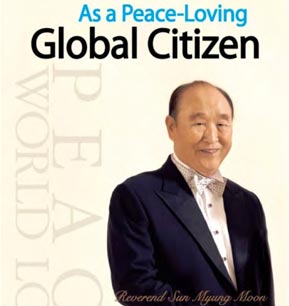ShareThis
Rev. Sun Myung Moon

As a Peace-loving Global Citizen is the autobiography of Rev. Sun Myung Moon, the founder of the Unification Movement. It was published in 2009 in both Korean and English by Gimm-Young Publishers of Seoul, South Korea. The book was released in South Korea on March 9, 2009 and debuted at #3 on the Businesss bestseller's list. It has ranked in various bestseller lists since then and was ranked 15th on the General bestseller's list as of October 14, 2009.
A Command That Must Be Obeyed
In prison, the authorities beat me endlessly and demanded that I confess my crimes. I endured, though. Even as I was vomiting blood and seemed on the verge of death, I never let myself lose consciousness. Sometimes the pain would be so great I would bend over at the waist. Without thinking, I found myself praying, “God, save me.” In the next moment, though, I caught myself and prayed with confidence, “God, don’t worry about me. Sun Myung Moon is not dead yet. I won’t let myself die in such a miserable way as this.” I was right. It was not yet time for me to die. There was a mountain of tasks before me that I had to accomplish. I had a mission. I was not someone so weak as to be beaten into submission by something as trivial as torture.
Each time I collapsed from the torture I would endure by telling myself, “I am being beaten for the sake of the Korean people. I am shedding tears as a way of shouldering the pain of our people.” When the torture was so severe that it took me to the verge of losing consciousness, I would invariably hear the voice of God. In the moments when my life seemed about to end, God would appear to me. My body still carries several scars that I received then. The flesh that was gouged from my body and the blood that was lost have been replaced, but the pain of that experience remains with me in these scars. I have o.en looked at these scars and told myself, “Because you carry these scars, you must succeed.”
I was scheduled to go to trial on April 3, the fortieth day of my imprisonment. This was delayed by four days, however, and my trial was held on April 7. Many of the most famous ministers in North Korea came to the courtroom and accused me of all manner of crimes. The Communist Party also scorned me, saying religion was the opiate of the people. Members of our congregation stood to one side and wept sorrowfully. They wept as though their child or husband had passed away. I did not shed tears, however. I had members who would weep for me with such sorrow that they were writhing in pain, so I did not feel lonely as I traveled Heaven’s path. I was not facing misfortune, so I felt I should not weep. As I left the courthouse a.er my sentencing I raised my shackled hands and shook them as a sign to our members. The shackles made a clanging sound that sounded to me like bells. That day I was taken to the Pyongyang Prison.
Wednesday, November 24, 2010
|
Labels:
A Command that Must Be Obeyed part7
|
CONTENT
- FOREWORD
- CHAPTER ONE - Food is Love
- CHAPTER TWO - A River of Heart Flows with Tears
- CHAPTER THREE - The Man with the Fullest Stomach
- CHAPTER FOUR - Why We Work Globally
- CHAPTER FIVE - True Families Create True People
- CHAPTER SIX - Love Will Bring Unification
- CHAPTER SEVEN - Future of Korea, Future of the Wor...
- CHAPTER EIGHT - Message for Young People

